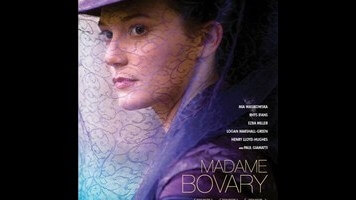Mia Wasikowska plays Madame Bovary in a passable take on the great novel

Emma Bovary, the protagonist of Gustave Flaubert’s 1856 novel Madame Bovary, ranks among the most fearsomely complex characters in classic literature. On the surface, she can be insufferable: a creature of pure impulse, selfish and entitled, like a 19th-century Kardashian trapped in a reality show she can’t handle. Flaubert ridicules her constantly, but he also feels tenderly toward her, and that tension, which exists at the very heart of his prose, is one source of the novel’s enduring genius. It’s also extremely difficult to translate into a screen performance, though many have tried. (The best-known adaptations are the 1949 MGM version, directed by Vincente Minnelli and starring Jennifer Jones, and Claude Chabrol’s 1991 film, with Isabelle Huppert in the title role.) The latest attempt places most of the burden on Mia Wasikowska, who’s apparently doing a tour of all the books she read in school, having played Jane Eyre a few years ago. Unafraid to make Emma decidedly unsympathetic, Wasikowska tries hard to convey the character’s sense of feeling stifled by her era, but the movie still can’t quite capture her shallow depth.
Directed and co-written by Sophie Barthes (Cold Souls), this Madame Bovary heavily streamlines the narrative, skipping past the early sections (which focus on Emma’s future husband, Charles Bovary, and their courtship) and cutting the couple’s daughter, Berthe, altogether. As it opens, Emma has already been promised to Charles (Henry Lloyd-Hughes), after years spent being raised in a convent, and is deliriously happy about the prospect of being married. The honeymoon is over quickly, however, as Charles is neither as dashing nor, crucially, as professionally ambitious as she had hoped. He’s quite content to remain a middle-class country doctor practicing in the (fictional) village of Yonville, a dull backwater. Bored out of her mind, Emma at first halfheartedly deflects the advances of other admirers, but is soon taking lovers, including a local Marquis (Logan Marshall-Green) and a young law student (Ezra Miller). Meanwhile, she makes extravagant purchases on credit from a manipulative merchant, Monsieur Lheureux (Rhys Ifans), which threaten to bring the Bovary family (such as it is here, the kid being gone) to ruin.
Cold Souls (2009), a goofy sci-fi movie about literal soul storage and trafficking that starred Paul Giamatti (who also turns up in a small role here) as a fictionalized version of himself, was anything but subtle. So it’s a relief to see how strenuously Barthes works to avoid “explaining” Emma’s behavior, and how willing both she and Wasikowska are to risk having the character come across as spoiled. Unfortunately, shots of Emma looking longingly out of windows and brushing her fingers excitedly over a map of Paris are no substitute for Flaubert’s prose, which has the literary advantage of being able to peer into minds. In particular, the movie fails to suggest how much Emma’s romantic yearning and material acquisitiveness have been influenced by the trashy novels she read growing up; it’s as if a story heavily dependent on the corrosive effects of pop culture—The Bling Ring, say—had ignored that aspect entirely. Wasikowska gives a solid, emotionally precise performance, ably supported by the men around her (especially Ifans, who relishes Monsieur Lheureux’s unctuous cajolery), and the result is intelligent and eminently watchable. But if you’ve turned one of the greatest novels ever written into something merely “watchable,” you have failed.